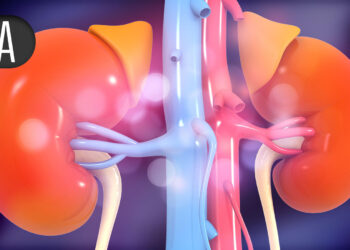TOPLINE:
Sustained clinical remission for at least 3 years in patients with systemic lupus erythematosus (SLE) and active lupus nephritis significantly reduced the probability of developing impaired kidney function and protected against an increase in the Systemic Lupus International Collaborating Clinics Damage Index (SDI).
METHODOLOGY:
- A retrospective cohort study on a historical cohort of patients with SLE diagnosed between 1970 and 2016 was conducted to assess the minimum duration of renal and extrarenal remission required to protect against the development of impaired kidney function in lupus nephritis.
- A total of 293 patients with biopsy-proven lupus nephritis (median age at diagnosis, 28.7 years; 87.4% women; 91.5% White) with at least 5 years of follow-up after treatment initiation and at least two evaluations every year were included.
- Patients were assessed for disease activity using the SLE Disease Activity Index (SLEDAI)-2K and for damage using the SDI. The occurrence of impaired kidney function, defined as having serum creatinine levels > 1 mg/dL with an estimated glomerular filtration rate (eGFR) < 60 mL/min/1.73 m² and inactive urinary sediment for at least three measurements for 3 months, was also examined.
- Sustained clinical remission was defined as an SLEDAI-2K score of 0, which includes proteinuria less than 0.5 g/24 h and an eGFR > 60 mL/min/1.73 m² for at least 1 year with or without glucocorticoids and/or immunosuppressive treatment.
- The percentage of patients accruing damage and the average annual increase in damage were assessed over a median follow-up duration of 15.7 years.
TAKEAWAY:
- Overall, 84.3% of patients achieved sustained clinical remission lasting 8.7 years after a median duration of 2 years from the onset of lupus nephritis.
- The duration of sustained clinical remission was inversely correlated with an increase in the SDI (P < .001), and 3 years of sustained clinical remission was the shortest duration to protect against an increase in the SDI (P = .003 for 3 years; P = .001 for ≥ 4 years).
- Patients who achieved 3 years of sustained clinical remission had a 90% lower probability of developing impaired kidney function than those who never achieved remission (hazard ratio, 0.10; P < .001).
- Patients with at least 3 years of sustained clinical remission had higher rates of impaired kidney function–free survival at 10, 20, and 25 years (99%, 96%, and 91%, respectively) than those who never achieved remission (87%, 68%, and 40%, respectively; P < .001).
IN PRACTICE:
“Our observations suggest that pursuing at least 3 years of clinical remission encompassing both the renal and extrarenal domains could significantly improve prognosis in LN [lupus nephritis] patients by avoiding IKF [impaired kidney function] in most of them,” the authors wrote.
SOURCE:
This study was led by Mariele Gatto, MD, PhD, University of Turin, Mauriziano Umberto Hospital in Turin, and Giulia Frontini, San Paolo Hospital in Milan, both in Italy. It was published online on February 28, 2025, in Annals of the Rheumatic Diseases.
LIMITATIONS:
Study findings were not generalizable to non-White populations. Data on comorbidities and usage of non-immunosuppressant drugs relevant in lupus nephritis were missing. Continuous and cumulative remissions were considered jointly and not differentiated.
DISCLOSURES:
No specific funding was received for this research. The authors reported having no conflicts of interest.
This article was created using several editorial tools, including AI, as part of the process. Human editors reviewed this content before publication.
Source link : https://www.medscape.com/viewarticle/what-duration-sustained-clinical-remission-prevents-lupus-2025a10006sa?src=rss
Author :
Publish date : 2025-03-21 11:13:00
Copyright for syndicated content belongs to the linked Source.














